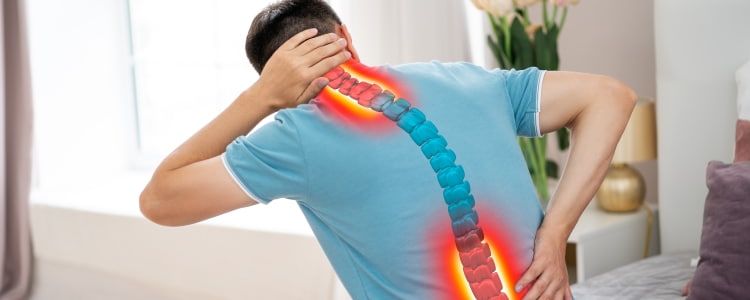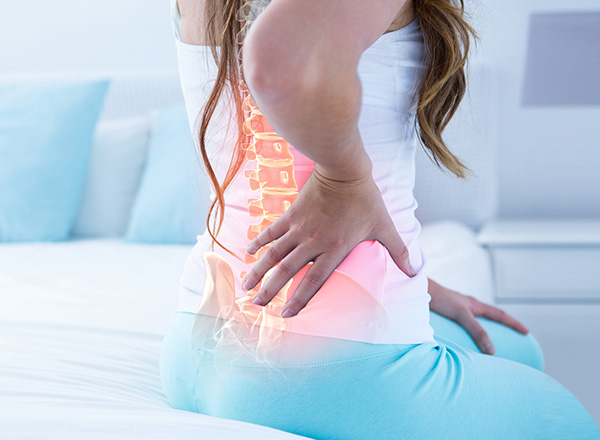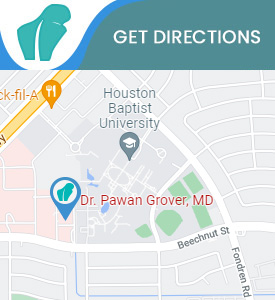Slipped Disc Treatment Specialist in Houston, TX
Most slipped disc cases improve with conservative treatment, including rest, pain medication, physical therapy, and home exercises. Surgery is often considered only if symptoms are severe or do not improve with other treatments. In some cases, epidural steroid injections may be used to help reduce pain and inflammation. To find out the best course of action for you, visit our board-certified specialist, Dr. Pawan Grover, MDPA at InovoSpine. For more information, contact us or book an online appointment. We serve patients from Houston, TX, and surrounding areas.




Table of Contents:
What causes a slipped disc?
Can a slipped disc heal on its own?
Is a slipped disc very serious?
How does Dr. Pawan Grover fix a slipped disc?
Various factors can contribute to the risk of a slipped disc, such as excessive body weight, a sedentary lifestyle, occupations requiring heavy, repetitive lifting, bending, and twisting, and traumatic events like falls or car accidents. Some people inherit a predisposition to developing a slipped disc due to inherited factors that affect the structure or composition of their discs. However, in most cases, genetic factors, aging, lifestyle, and physical activity levels determine the risk of developing this condition.
We also educate our patients about the risks associated with smoking. It damages the blood vessels that supply nutrients to the discs, weakening them and making them more susceptible to injury. It also lessens the oxygen supply to the disc, leading to rapid degeneration.
Certain medical conditions, such as osteoporosis and spinal stenosis, can also increase the probability of a disc slipping out of place by weakening the bones and ligaments around the spine. We offer comprehensive treatment plans for these conditions to strengthen your spine and reduce the risk of a slipped disc.
Remember, anyone can develop a slipped disc. Therefore, maintaining a healthy lifestyle, keeping a regular exercise routine, and using correct lifting techniques can help prevent this painful condition. We are committed to helping you maintain a healthy spine and prevent conditions like slipped discs.
The good news is that many slipped discs can heal on their own due to the body’s natural healing processes. However, it’s essential to understand that healing doesn’t always mean the root cause of the problem has been addressed. Lifestyle factors like poor posture, lack of exercise, and excess body weight can contribute to a slipped disc’s occurrence. Unless these factors are addressed, there’s a risk of another slipped disc in the future.
While many slipped discs will heal naturally, non-surgical treatment options can help alleviate symptoms and expedite recovery. These can include medications, physical therapy, chiropractic care, and lifestyle modifications. We can guide you through these treatments, helping you strengthen your back muscles, improve your posture, and make necessary lifestyle changes.
However, in some cases, a slipped disc might not heal naturally and may require more invasive treatments. If the slipped disc causes significant nerve compression leading to severe pain, weakness, or loss of bowel or bladder control, surgical intervention may be necessary.
When it comes to spinal health, it’s always best to consult with professionals like those at InovoSpine. We can provide an accurate diagnosis and guide you through the appropriate treatment plan, whether it involves conservative treatments or more invasive procedures. If you suspect you have a slipped disc, don’t hesitate to reach out to us.
The severity of a slipped disc can significantly differ, determined by variables such as the position and size of the herniation and the general well-being of the patient. In some cases, you may not even be aware of the condition due to a lack of symptoms. A slipped disc can be debilitating, causing intense pain and potentially leading to conditions such as sciatica if located in the lower back or issues with the neck, shoulders, arms, and hands if located in the neck.
While not typically a medical emergency, a slipped disc can become serious if it leads to symptoms like loss of bowel or bladder control, severe numbness in the inner thighs or genitals, or severe pain unresponsive to rest, medication, or physical therapy. These symptoms might point to a medical emergency, cauda equina syndrome, that requires immediate surgical intervention.
Complications of untreated slipped discs can be severe, ranging from permanent nerve damage and muscle atrophy to paralysis and cauda equina syndrome. Therefore, prevention is key. Factors such as heavy lifting, sudden twisting or bending, poor posture, obesity, and smoking can increase your risk.
Dr. Pawan Grover, MDPA, is an expert in diagnosing and treating conditions such as slipped discs, also known as herniated discs. Our team of highly trained medical professionals understands that a slipped disc can cause severe pain, numbness, or weakness in the affected area, disrupting your everyday life.
Dr. Pawan will perform a thorough examination, review your medical history, and may also order imaging tests such as an MRI or CT scan to accurately diagnose your condition and assess the severity of your herniation.
We prioritize your comfort and well-being. Our treatments for slipped discs are primarily focused on relieving pain, reducing inflammation, and improving flexibility and strength in your back. Initially, we often recommend conservative methods like rest and over-the-counter pain medications such as nonsteroidal anti-inflammatory drugs.
If these treatment methods do not provide enough relief, our team may prescribe stronger pain relievers or muscle relaxants.
Physical therapy is an important part of the treatment process. We will guide you through exercises and stretches designed to reduce pain and inflammation, improve flexibility, and strengthen the back muscles. Not only does this help alleviate current symptoms, but it also prevents future injuries.
Along with the treatments, we also encourage lifestyle changes like maintaining a healthy weight to reduce stress on the discs in your lower back and engaging in regular low-impact exercise to improve core strength. These measures not only aid in the treatment but also in the prevention of slipped discs.
In cases where conservative treatments do not improve symptoms after several weeks or months, our team will discuss surgical options with you. These options could include a microdiscectomy, where the portion of the disc pressing on a nerve is removed, or, in some cases, the removal of the entire disc and fusion of the vertebrae for spinal stability.
At InovoSpine, we are committed to providing the best treatment for your specific condition and lifestyle. With the right treatment, patience, and persistence, we believe that most people can recover from a slipped disc and regain their quality of life. Contact us today or book an appointment online to start your journey to a pain-free life. We serve patients from Houston TX, Hedwig Village TX, Meadows Place TX, Missouri City TX, Hunters Creek Village TX, Spring Valley Village TX, and surrounding areas.

Additional Service You May Need
- Regenerative Medicine
- Spinal Arthritis
- Diagnostic Mapping
- Interventional Pain
- Minimally Invasive
- Spine Pain
- Radiofrequency Ablation
- Spinal Cord Stimulation
- Physical Rehabilitation
- Facet Joint Pain
- Herniated Discs
- Muscle and Joint Pain
- Post-Laminectomy Pain
- Myofascial Pain
- Peripheral Nerve Pain
- Regional Pain Syndrome









